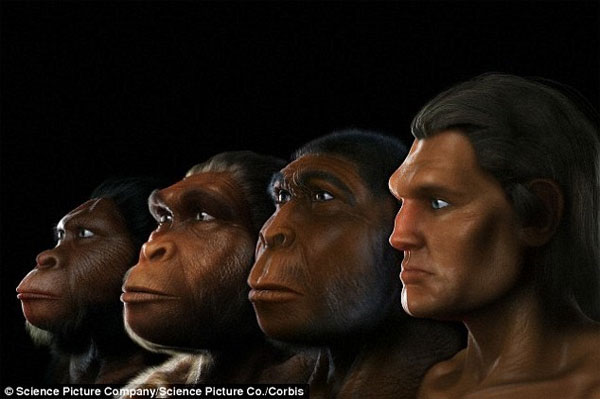Climate change changes the evolution of mankind
Ancient ancestors of humanity had to cope with climate change to survive droughts, cold and flooding. And now, more and more scientists believe that Earth's climate changes have created some characteristics of humankind.
Their research suggests that leaps of evolution such as the brain grow bigger or the ability to create and use complex tools related to periods of unstable climate.
Dr. Peter deMenocal, a researcher at Columbia University, said that the hypothesis that the scientists set out above is based on "randomness" , but they are studying the tooth samples of the ancient people and the classes. Sediment on the seabed to reinforce this hypothesis.
The collected information can help scientists clarify whether climate change has caused evolution in humans, as well as finding ways to prove that leaps of evolution are not thanks to adapt to a change that is with a variety of changes of the surroundings.

Four stages of human evolution.(Source: Corbis)
Dr. Rick Potts of the Smithsonian Institute for Human Species Studies said at least two leaps of evolution have been linked to climate change.
The first time it happened about 3 million years ago, when the extinct and Homo Australopithecus afarensis appeared, with fossil samples showed that the brain had grown bigger and the introduction of the first tools.
The second time was between 1.5 and 2 million years ago, when Homo erectus used sophisticatedly crafted axes and became the first to leave Africa.
Dr. Potts said that both of these events occurred at the same time as the obvious changes in climate, when the forested areas turned into grasslands due to rising temperatures. He said that the change of environment 3 million years ago caused people to gradually switch to straight legs instead of climbing with all four legs.
Dr. deMenocal said that specimens from the seabed along the African coast show different layers of sediment: deeper colored layers formed during the dry period, while those with lighter colors form in wet period.
This suggests that once every 20,000 years, the Earth's climate changes from drought to wet, and the effect of this change can be seen clearly at two important stages in species evolution. primitive people.

The climate change in the Great Rift Valley is directly correlated with the evolutionary changes of people here.(Source: Corbis)
Dr. Mark Maslin of London College (UCL) said clearer evidence found in the Great Rift Valley runs through Ethiopia, Kenya and Tanzania.
Through studying the rock layers here, he discovered that the catchment areas that are very sensitive to climate change occurred 1.5-2.7 million years ago.
He said: "We discovered special stages, when the lakes dried up and filled again in water correlated directly with the major changes in human evolution."
Scientists are also looking for evidence from human ancestors' fossil teeth to see how their diets change with the climate. They found that the diet of primitive human beings was very diverse in terms of food, showing that they were able to flexibly adapt to the changing environment.
However, this study does not explain why climate change can cause leaps of evolution. Dr. Maslin acknowledged that any theory could be accurate, for example, the human brain must grow to be able to think and find food in the drought season or when food is scarce.
He also said that when the climate is humid and the food is high, women also become more careful in choosing partners to produce healthier and smarter children.
Dr. John Stewart of Bournemouth University said that ancient humans changed their places when climate changed, creating groups of people living separately and evolving faster in certain areas.
The title has been reset by repository.
- Climate change can affect frog evolution
- Where do we humans evolve?
- This is how Dubai copes with climate change
- What is Climate Change?
- Climate change makes organisms evolve faster
- Warm climate speeds up the evolution of reptiles
- Marching for climate change around the world
- The terrifying change of the Earth due to climate change
- SimCLIM helps build climate change scenarios
- Climate change is happening faster than expected
- 4 shocking findings on climate change
- Too many animals and plants disappear due to climate change
 Discovered an ancient centipede fossil 99 million years old
Discovered an ancient centipede fossil 99 million years old Discovered bat-like dinosaurs in China
Discovered bat-like dinosaurs in China Discovered a 200-year-old bronze cannon of the coast
Discovered a 200-year-old bronze cannon of the coast Discover 305 million-year-old spider fossils
Discover 305 million-year-old spider fossils